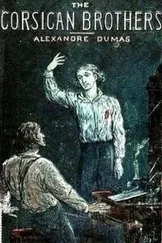Александр Дюма - The Conspirators
Здесь есть возможность читать онлайн «Александр Дюма - The Conspirators» весь текст электронной книги совершенно бесплатно (целиком полную версию без сокращений). В некоторых случаях можно слушать аудио, скачать через торрент в формате fb2 и присутствует краткое содержание. Год выпуска: 2014, Издательство: epubBooks Classics, Жанр: Историческая проза, на английском языке. Описание произведения, (предисловие) а так же отзывы посетителей доступны на портале библиотеки ЛибКат.
- Название:The Conspirators
- Автор:
- Издательство:epubBooks Classics
- Жанр:
- Год:2014
- ISBN:нет данных
- Рейтинг книги:3 / 5. Голосов: 1
-
Избранное:Добавить в избранное
- Отзывы:
-
Ваша оценка:
- 60
- 1
- 2
- 3
- 4
- 5
The Conspirators: краткое содержание, описание и аннотация
Предлагаем к чтению аннотацию, описание, краткое содержание или предисловие (зависит от того, что написал сам автор книги «The Conspirators»). Если вы не нашли необходимую информацию о книге — напишите в комментариях, мы постараемся отыскать её.
The Conspirators — читать онлайн бесплатно полную книгу (весь текст) целиком
Ниже представлен текст книги, разбитый по страницам. Система сохранения места последней прочитанной страницы, позволяет с удобством читать онлайн бесплатно книгу «The Conspirators», без необходимости каждый раз заново искать на чём Вы остановились. Поставьте закладку, и сможете в любой момент перейти на страницу, на которой закончили чтение.
Интервал:
Закладка:
"And he," she cried, "what has become of him?"
No one answered, for neither of the three persons who were in the room knew what reply to give; only Buvat, choking with tears, rose, and went toward the door. Bathilde understood the grief and remorse expressed in that mute withdrawal; she stopped him by a look, and extending her arms toward him—
"My father," said she, "do you no longer love your poor Bathilde?"
"I no longer love you, my darling child!" cried Buvat, falling on his knees, and kissing her hand, "I love you no longer! My God! it will be you who will not love me now, and you will be right, for I am worthless; I ought to have known that that young man loved you, and ought to have risked all, suffered all, rather than—. But you told me nothing, you had no confidence in me, and I—with the best intentions in the world—made nothing but mistakes; oh, unlucky, unhappy, that I am, you will never forgive me, and then—how shall I live?"
"Father," cried Bathilde, "for Heaven's sake try and find out what has happened."
"Well, my child, well, I will discover; will not you forgive me if I bring you good news? If the news is bad, you will hate me even more; that will but be just, but you will not die, Bathilde?"
"Go, go," said Bathilde, throwing her arms round his neck, and giving him a kiss in which fifteen years of gratitude struggled with one day of pain; "go, my existence is in the hands of God, He only can decide whether I shall live or die."
Buvat understood nothing of all this but the kiss, and—having inquired of Madame Denis how the chevalier had been dressed—he set out on his quest.
It was no easy matter for a detective so simple as Buvat to trace Raoul's progress; he had learned from a neighbor that he had been seen to spring upon a gray horse which had remained some half hour fastened to the shutter, and that he had turned round the Rue Gros Chenet. A grocer, who lived at the corner of the Rue des Jeuneurs, remembered having seen a cavalier, whose person and horse agreed perfectly with the description given by Buvat, pass by at full gallop; and, lastly, a fruit woman, who kept a little shop at the corner of the Boulevards, swore positively that she had seen the man, and that he had disappeared by the Porte Saint Denis; but from this point all the information was vague, unsatisfactory, and uncertain, so that, after two hours of useless inquiry, Buvat returned to Madame Denis's house without any more definite information to give Bathilde than that, wherever D'Harmental might be gone, he had passed along the Boulevard Bonne–Nouvelle. Buvat found his ward much agitated; during his absence she had grown rapidly worse, and the crisis foreseen by the doctor was fast approaching. Bathilde's eyes flashed; her skin seemed to glow; her words were short and firm. Madame Denis had just sent for the doctor.
The poor woman was not without her own anxieties; for some time she had suspected that the Abbe Brigaud was mixed up in some plot, and what she had just learned, that D'Harmental was not a poor student but a rich colonel, confirmed her conjectures, since it had been Brigaud who had introduced him to her. This similarity of position had not a little contributed to soften her heart—always kind—toward Bathilde. She listened, then, with eagerness to the little information which Buvat had been able to collect for the sufferer, and, as it was far from being sufficiently positive to calm the patient, she promised, if she heard anything herself, to report it directly.
In the meantime the doctor arrived. Great as was his command over himself, it was easy to see that he thought Bathilde in some danger—he bled her abundantly, ordered refreshing drinks, and advised that some one should watch at the bedside. Emilie and Athenais, who, their little absurdities excepted, were excellent girls, declared directly that that was their business, and that they would pass the night with Bathilde alternately; Emilie, as eldest, claimed the first watch, which was given her without contest. As to Buvat, since he could not remain in the room, they asked him to return home; a thing to which he would not consent till Bathilde herself had begged it. The bleeding had somewhat calmed her, and she seemed to feel better; Madame Denis had left the room; Mademoiselle Athenais also had retired; Monsieur Boniface, after returning from the Morgue, where he had been to pay a visit to the body of Roquefinette, had mounted to his own room, and Emilie watched by the fire–place, and read a little book which she took from her pocket. She shortly heard a movement in the bed, and ran toward it; then, after an instant's silence, during which she heard the opening and shutting of two or three doors, and before she had time to say—"That is not the voice of Monsieur Raoul, it is the Abbe Brigaud," Bathilde had fallen back on her pillow.
An instant afterward Madame Denis half opened the door, and in a trembling voice called Emilie, who kissed Bathilde and went out.
Suddenly Bathilde was aroused; the abbe was in the room next to hers, and she thought that she heard him pronounce Raoul's name. She now remembered having several times seen the abbe at D'Harmental's rooms; she knew that he was one of the most intimate friends of Madame de Maine; she thought, then, that the abbe must bring news of him. Her first idea was to slip from the bed, put on a dressing–gown, and go and ask what had happened; but she considered that if the news was bad they would not tell it, and that it would be better to overhear the conversation, which appeared animated. Consequently she pressed her ear to the panel, and listened as if her whole life had been spent in cultivating that single sense.
Brigaud was relating to Madame Denis what had happened. Valef had made his way to the Faubourg Saint Antoine, and given warning to Madame de Maine of the failure of the expedition. Madame de Maine had immediately freed the conspirators from their oaths, advised Malezieux and Brigaud to save themselves, and retired to the Arsenal. Brigaud came therefore to bid adieu to Madame Denis; he was going to attempt to reach Spain in the disguise of a peddler. In the midst of his recital, interrupted by the exclamation of poor Madame Denis and of Mesdemoiselles Athenais and Emilie, the abbe thought that he heard a cry in the next room, just at the time when he was relating D'Harmental's catastrophe; but as no one had paid any attention to the cry, and as he was not aware of Bathilde's being there, he had attached no importance to this noise, regarding the nature of which he might easily have been mistaken; moreover, Boniface, summoned in his turn, had entered at the moment, and, as the abbe had a particular fancy for Boniface, his entrance had naturally turned Brigaud's thoughts into a different channel.
Still, this was not the time for long leave–takings; Brigaud desired that daylight should find him as far as possible from Paris. He took leave of the Denis family, and set out with Boniface, who declared that he would accompany friend Brigaud as far as the barrier.
As they opened the staircase–door they heard the voice of the portress, who appeared to be opposing the passage of some one; they descended to discover the cause of the discussion, and found Bathilde, with streaming hair, naked feet, and wrapped in a long white robe, standing on the staircase, and endeavoring to go out in spite of the efforts of the portress. The poor girl had heard everything; the fever had changed into delirium; she would join Raoul; she would see him again; she would die with him.
The three women took her in their arms. For a minute she struggled against them, murmuring incoherent words; her cheeks were flushed with fever, while her limbs trembled, and her teeth chattered; but soon her strength failed her, her head sank back, and, calling on the name of Raoul, she fainted a second time.
Читать дальшеИнтервал:
Закладка:
Похожие книги на «The Conspirators»
Представляем Вашему вниманию похожие книги на «The Conspirators» списком для выбора. Мы отобрали схожую по названию и смыслу литературу в надежде предоставить читателям больше вариантов отыскать новые, интересные, ещё непрочитанные произведения.
Обсуждение, отзывы о книге «The Conspirators» и просто собственные мнения читателей. Оставьте ваши комментарии, напишите, что Вы думаете о произведении, его смысле или главных героях. Укажите что конкретно понравилось, а что нет, и почему Вы так считаете.












